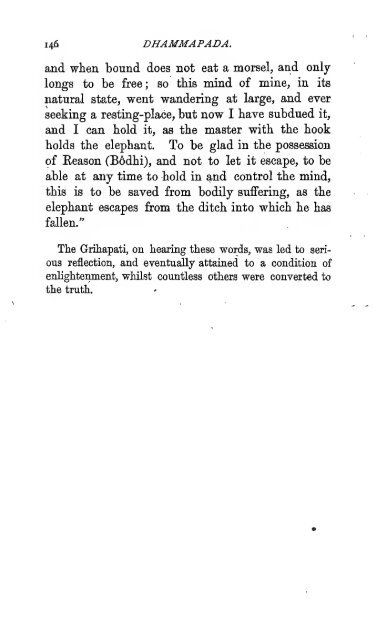Texts from the Buddhist canon : commonly known as Dhammapada
Texts from the Buddhist canon : commonly known as Dhammapada
Texts from the Buddhist canon : commonly known as Dhammapada
Create successful ePaper yourself
Turn your PDF publications into a flip-book with our unique Google optimized e-Paper software.
146<br />
DHAMMAPADA.<br />
and when bound does not eat a morsel, and only<br />
longs to be free; so this mind of mine, in its<br />
natural state, went wandering at large, and ever<br />
seeking a resting-place, but now I have subdued it,<br />
and I can bold it, <strong>as</strong> <strong>the</strong> m<strong>as</strong>ter with <strong>the</strong> hook<br />
holds <strong>the</strong> elephant. To be glad in <strong>the</strong> possession<br />
of Ee<strong>as</strong>on (B6dhi), and not to let it escape, to be<br />
able at any time to hold in ^nd control <strong>the</strong> mind,<br />
this is to be saved <strong>from</strong> bodily suffering, <strong>as</strong> <strong>the</strong><br />
elephant escapes <strong>from</strong> <strong>the</strong> ditch into which he h<strong>as</strong><br />
fallen."<br />
The Grihapati, on hearing <strong>the</strong>se words, w<strong>as</strong> led to seri-<br />
ous reflection, and eventually attained to a condition of<br />
enlightenment, whilst countless o<strong>the</strong>rs were converted to<br />
<strong>the</strong> truth.





